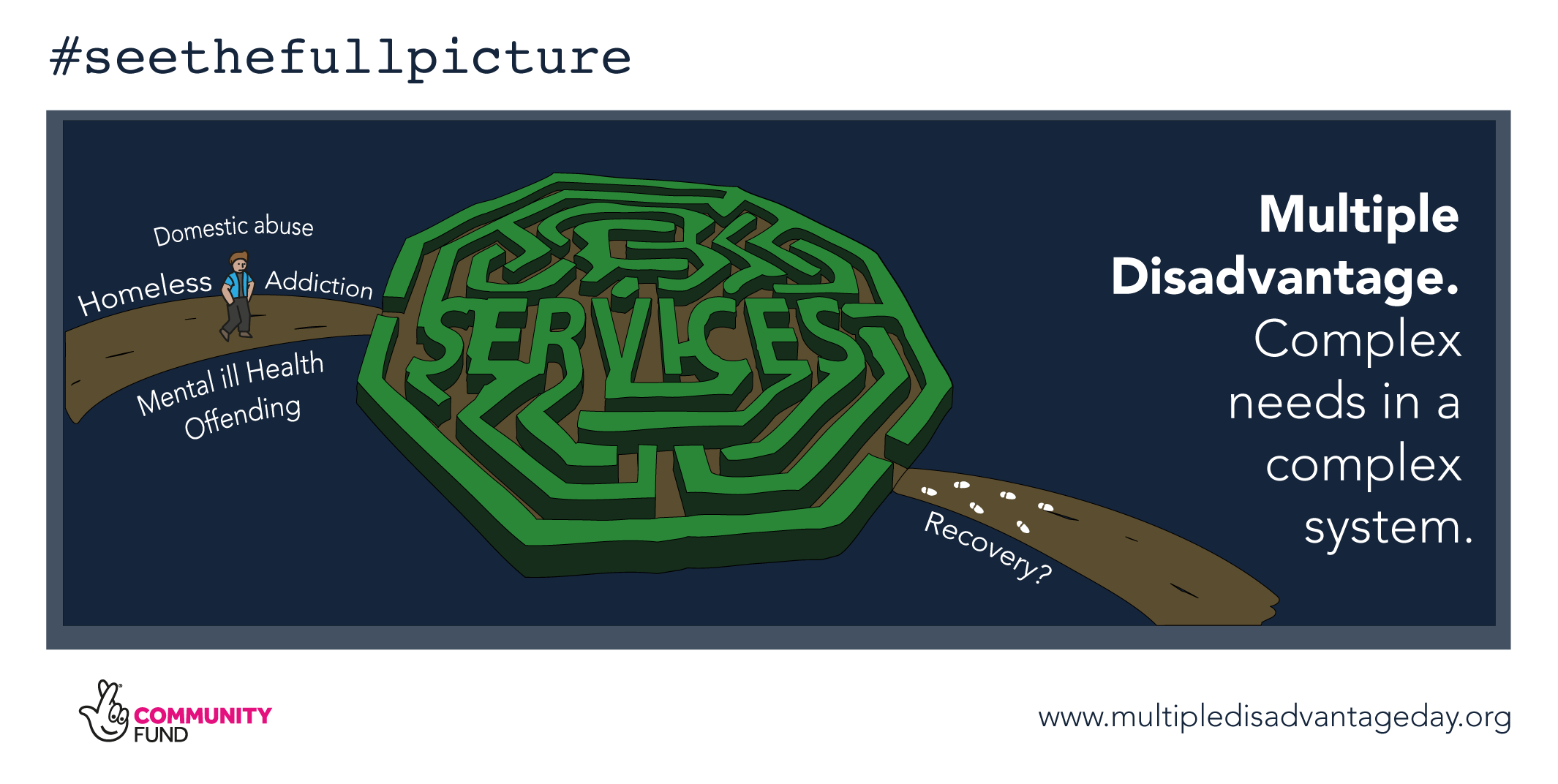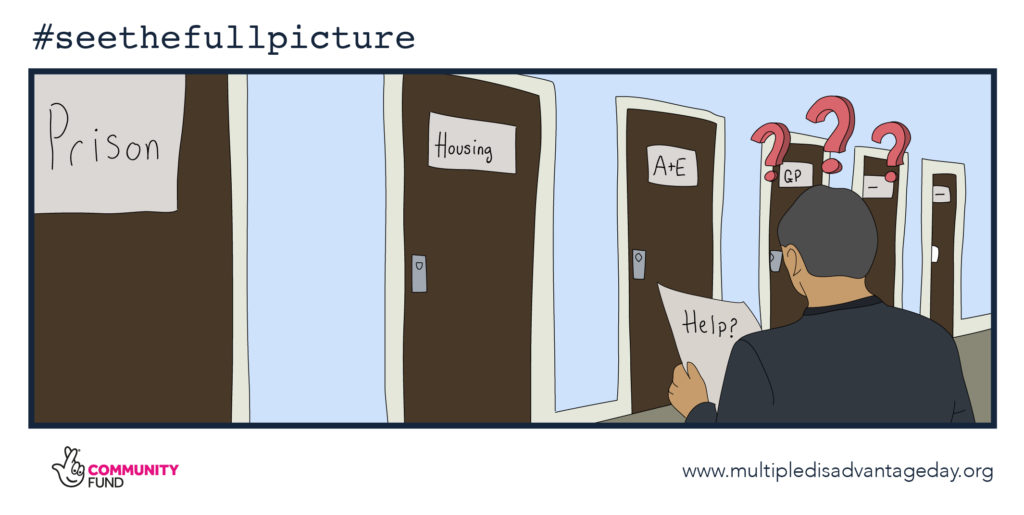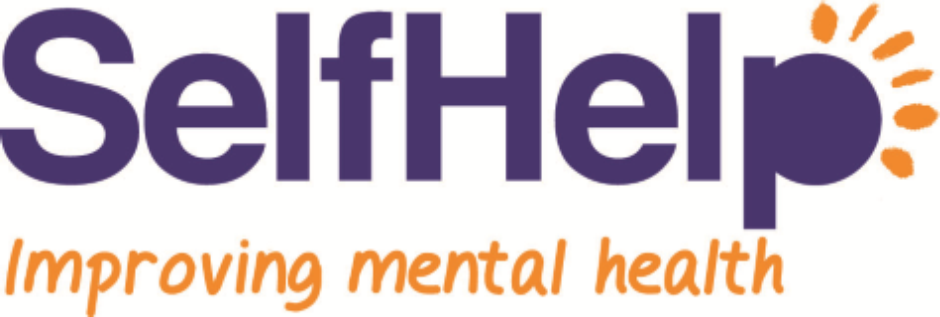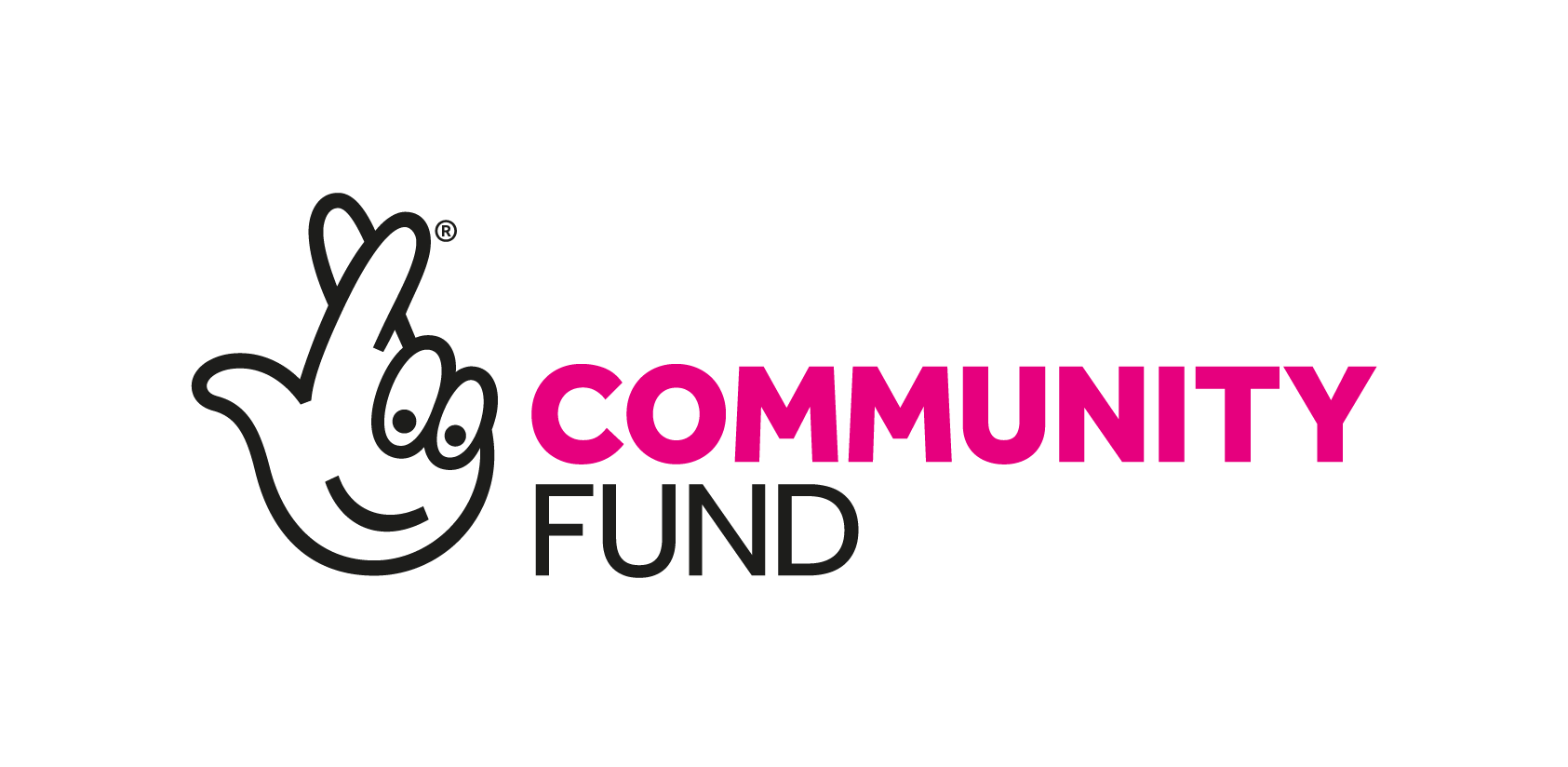
Multiple Disadvantage Day 2020 #SeeTheFullPicture
The 1st July 2020 marks the second annual Multiple Disadvantage Day, a campaign led by the Fulfilling Lives programme, raising awareness to the challenges experienced by people facing multiple disadvantages, who are among the most vulnerable and most marginalised members of our society.
Multiple disadvantage is recognised as a co-occurring combination of complex challenges, such as homelessness, addiction, repeated experience of the criminal justice system, mental ill-health and domestic abuse. The severity and complexity of a person’s problems means they are often turned away from the very services that are set up to help them, because their behaviour is seen as too challenging. This means people with the most severe problems are even further excluded.

This campaign has been co-created by 12 projects across England that form the Fulfilling Lives Programme: Supporting People with Complex Needs, and it has been fully informed by people who have or are currently facing complex needs. Inspiring Change Manchester, a partnership led by Shelter, is one of these projects which has been working to develop approaches which can improve support services to meet the needs of our members.
At ICM, staff, volunteers and beneficiaries work alongside each other, sharing knowledge and learning. There is no them and us. Just us. And we want you to join us and show your support.
We have spoken to our stakeholders and people involved with the programme to ask: What are the main challenges faced by people experiencing multiple disadvantage? And, can you highlight anything you think Inspiring Change Manchester has done to improve the situation of people experiencing multiple disadvantage?
Here is what they said:
Alison Mohamed – Director of Services, Shelter
What do you see as being the main challenges faced by people experiencing multiple disadvantage today?
- “People experiencing multiple disadvantage still sadly get shunted from pillar to post, get written off and judged, are not understood or even seen as human beings sometimes. I think a major practical challenge is the inflexibility of services to deal with the various elements affecting someone’s ability for recovery – the requirements to be sober/abstinent before people can receive support or get accommodation, the failure to see that drug/alcohol misuse could be masking major mental health problems which then get neglected, the failure to acknowledge the impact of things like racism, sexism, homophobia, on someone’s life chances.”
What would you highlight as key examples of what Inspiring Change has done to improve the situation of people experiencing multiple disadvantage?
- “There are lots of practical examples of how we have treated people as individuals, as humans, which has contributed to their recovery, and to their giving something back to us by supporting the scheme as a peer mentor, for example. And I also value the difference ICM has made to systems in Manchester, because that’s what will bring about lasting change. We have a lot to learn from ICM’s philosophy and practice, not just within Shelter, but across the sector.”
Helen Jackson –Managing Solicitor, Shelter
What are the main challenges faced by people experiencing multiple disadvantage?
- “It is hard enough to cope with addressing one disadvantage but when someone is struggling with multiple disadvantages it is so much harder. It is a struggle to achieve the most basic things without a roof over your head but compound that with other disadvantages such as mental health problems and life becomes so much harder.”
Can you highlight anything you think Inspiring Change has done to improve the situation of people experiencing multiple disadvantage?
- “Inspiring Change is an amazing programme which has been moulded by people experiencing multiple disadvantage and learning from their experiences. I have seen clients who I have referred into Inspiring Change who have experienced years of homelessness, substance abuse and mental health problems whose lives have been changed by the support and engagement provided by Inspiring Change.”
Pete Atherton – Managing Director, Community Led Initiatives
What are the main challenges faced by people experiencing multiple disadvantage?
- “The basic things that most of us take for granted in our lives are the same things that are hardest to achieve for people who experience multiple disadvantage. Somewhere safe to sleep at night, knowing where your next hot meal is coming from, having the opportunity to thrive in your life and being accepted by your community.”
Can you highlight anything you think Inspiring Change has done to improve the situation of people experiencing multiple disadvantage?
- “Inspiring Change has led a step-change in the way Manchester responds to the needs of some of the most vulnerable in our communities. ICM has influenced the city’s power holders, built collaborative networks of organisations and changed public attitudes towards people often ignored or overlooked. And all the while, nurturing people to overcome past traumas and create a new life where they can shine.”
Siobhan Pollitt – CEO, Back on Track
What are the main challenges faced by people experiencing multiple disadvantage?
- “It takes determination and commitment to overcome what is for some a lifetime of disadvantage but people do it – with time and the right conditions people change their lives. Then the challenge is to stay hopeful and sustain that progress when, because of systemic inequality, there are just not enough open doors.”
Can you highlight anything you think Inspiring Change has done to improve the situation of people experiencing multiple disadvantage?
- “By enabling people with lived experience to influence and be heard, the ICM community challenges us personally and at operational, organisational and strategic levels to do better and to work together to change and design systems that put the person at the centre. The principles that have evolved are a touchstone and have resulted in big and small changes in services – each one makes a difference!”
Dylan Gwilym – Mental Health Co-ordinator, Self Help Services
What are the main challenges faced by people experiencing multiple disadvantage?
- “Having worked at Inspiring Change as the Mental Health Coordinator for the past eighteen months, I feel one of the main challenges faced by people experiencing multiple disadvantage is knowing how to access the correct support for their specific needs. In addition, overcoming some of their perception of stigma that they may encounter from society”.
Can you highlight anything you think Inspiring Change has done to improve the situation of people experiencing multiple disadvantage?
- “In terms of mental health support, Inspiring Change has given members the opportunity to explore their mental health needs in a safe and confidential environment, enabling them to develop more effective coping strategies. The service as a whole has given people experiencing multiple disadvantage a platform to express themselves and voice their opinions to implement change”
Colm Gallagher – Clinical Psychologist, GMMH
What are the main challenges faced by people experiencing multiple disadvantage?
- “How do you help someone who is clearly in need, yet communicates no need for help?”
- “Ten years of austerity continues to damage the offer of services. These services are requested to operate with a focus on outcome rather than to place importance on (interpersonal, intrapersonal, community) processes. Subsequently enforced short term contracts across the sector fail to take into consideration the requirements that our work starts with developing safe relationships with all other support pivoting from there. Austerity ideology creates and facilitates trauma in the homeless system – this is often individualised by language such as “lifestyle choice; intentionally homeless; …not ready….”, and “burnout” when it comes to staff experiences. Such language runs the risk of de-humanising individuals who experiences homelessness and may lead to increased risk of pathologising experiences of homelessness. Such language is disingenuous to the experiences and realities of those who experience homelessness and to the experiences of those who work in the sector. The importance of the experiences of those who work in the sector, particularly the front line, cannot be underestimated as it is the front line staff who are lifeblood of the support is offered to individuals who are multiply disadvantaged. If these staff are supported by having access to training, reflective practice, sound team/system working and having the flexibility to work safely and creatively with others then it will improve efficiency and effectiveness of the whole system of support.”
- “Services which are not accessible, acceptable, efficient, effective, equitable and relevant to those who experience homelessness – in relation to how the person enters the service, the service they receive and the outcome of working with that service.”
Can you highlight anything you think Inspiring Change has done to improve the situation of people experiencing multiple disadvantage?
- “The process and outcome of the peer-led pieces of participative research which produced the “Cause and Consequences” report. Cause and Consequence recommendations were fully embraced the GMMH led and multi-agency ‘Mental Health and Homeless Operational Group’ in Manchester. Over the couple of years since the report we have seen the Mental Health Homeless Team develop to be a psychologically aware and trauma informed service; training developed and delivered to over approximately 450 front lines staff (including 250 who attended a 2 day equivalent PIE course); PIE two year pilot project in hostels/rough sleeper teams; pilot in primary care mental health in homeless day centre and many other initiatives and learnings which are ongoing.”
Safia Griffin – Women’s Influence Worker, MASH
What are the main challenges faced by people experiencing multiple disadvantage?
- “Still being seen as an intervention or problem that can be ‘fixed’ by a service. We will only see real and lasting change when the system moves past this rigid model and allows for more holistic, flexible, relational approaches that builds people’s sense of control, choice and skills.”
Can you highlight anything you think Inspiring Change has done to improve the situation of people experiencing multiple disadvantage?
- “How we understand multiple disadvantage and barriers in the system and how this can change through properly involving people with personal insight into these disadvantages in the system, changing the culture and processes from the inside out.”

Ben Shute – Programme Administrator, ICM
What are the main challenges faced by people experiencing multiple disadvantage?
- “The main challenge faced by people experiencing multiple disadvantage is not being able to access services in a sustained way that will benefit their lives. Lack of access to an essential service will then have a have a negative impact on other aspects of their life (e.g. no access to drug and alcohol service will impact mental health) and can result in a spiral effect. Obvious challenges include access to technology and ability to use it, having someone reliable advocating on their behalf and having the right structure around their life to be able to help themselves.”
Can you highlight anything you think Inspiring Change has done to improve the situation of people experiencing multiple disadvantage?
- “Inspiring Change has given people accessing the service a feeling of community which improves their confidence and self-worth. It has given them a means to access services they may not have previously had. The journey they have through the service also ensures that they learn and are given the ability to increasingly do things self-sufficiently.”
Ped Durling, Housing First Development Officer, ICM
What are the main challenges faced by people experiencing multiple disadvantage
- “The separation of support for mental health, substance misuse and housing is one of the biggest challenges those experiencing multiple disadvantage face. The requirement for the vulnerable to attend multiple assessments and meetings in different parts of the city makes the support networks unnavigable and fails people before they even get in the door.”
Can you highlight anything you think Inspiring Change has done to improve the situation of people experiencing multiple disadvantage.
- “ICM has created a place where support for a wide range of issues is available, all under one roof. Moreover the choice of which support need to address and when is totally down to the member.”
Paul Norrington, Peer Mentor, ICM
What are the main challenges faced by people experiencing multiple disadvantage?
- “People facing multiple disadvantage are likely to live in poverty and face discrimination, stigma, isolation, and loneliness. They can sometimes feel left out or overlooked as a lot of local services are designed to deal with people with single severe conditions one problem at a time.”
Can you highlight anything you think Inspiring Change has done to improve the situation of people experiencing multiple disadvantage?
- “Inspiring Change provides a multi-agency approach in one well-organized hub. It can offer help with housing via Shelter and Housing First but also with employment and training via Back On Track, tackling mental health problems with Self Help and provides a community-based location where service users can check-in and involve themselves in things like the art groups, women’s groups, men’s groups and get involved with having a mentor to help improve their situation. It allows people to use lived experience to make positive changes from negative experiences. It focuses on equality and inclusion and reducing stigma.”
Andy Hughes, Peer Mentor, ICM
What are the main challenges faced by people experiencing multiple disadvantage?
- “An inability to function as an equal in the community. For example, access to services they are entitled to.”
Can you highlight anything you think Inspiring Change has done to improve the situation of people experiencing multiple disadvantage?
- “ICM gives people a voice to access services, a place to belong and freedom from isolation.”
Vinny Debotte, Peer Mentor, ICM
What are the main challenges faced by people experiencing multiple disadvantage?
- “People facing multiple disadvantages experience a combination of problems including homelessness, substance misuse criminal justice and mental ill health they fall between the cracks in services and systems making it harder for them to address their problems and lead fulfilling lives!”
Rose Channce, Senior Engagement Worker, ICM
What are the main challenges faced by people experiencing multiple disadvantage?
- “Settled accommodation; access to and management of finances; trauma, coping strategies and their consequences; familial and social ties or lack thereof.”
- “Sustaining temporary accommodation whilst living in chaos and accessing mental health support whilst dependent on substances.”
- “Isolation, exclusion”
Can you highlight anything you think Inspiring Change has done to improve the situation of people experiencing multiple disadvantage?
- “Helped get people off the streets and into accommodation during Covid. Keep people in accommodation . Maintaining contact during lockdown and helping people keep their spirits up.”
- “Challenging homelessness decisions made by MCC and the persistence of ICM engagement workers and multi agency working”
- “Strengths and asset based activities, both in groups or 121 – ICM values the person centred approach to establish trusting relationships, encouraging inclusivity based on what an individual wants, respects and values.”
Francois Ladam, Engagement Worker, ICM
What are the main challenges faced by people experiencing multiple disadvantage?
“In my view, the called “welfare system” is not designed for people with multiple disadvantage. This is especially true and obvious for Universal Credit where people with low literacy skills or IT illiterate have serious handicap to access it. Also the highly demanding rules do not take into account the multiple needs of the people we support and the difficulties they have to comply with those rules.”
Can you highlight anything you think Inspiring Change has done to improve the situation of people experiencing multiple disadvantage?
- “ICM mediates with the welfare system and explain to statutory services the specificities and the challenges people with multiple disadvantage faces every day.”








